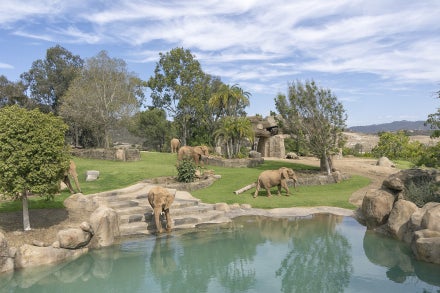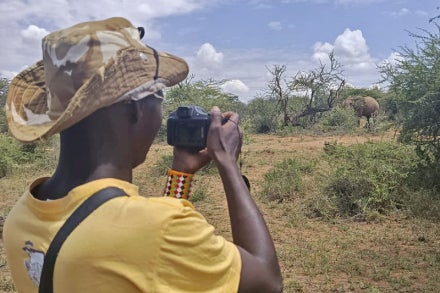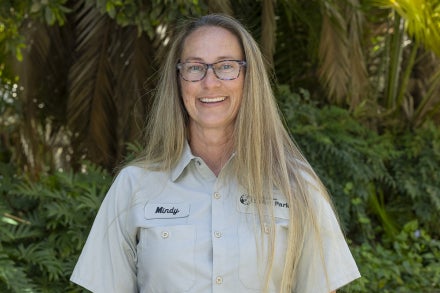
I watched many cartoons as a kid. And my favorites seemed to have a common element—vultures. More specifically, it was the menacing, dark, hungry expression they all seemed to convey. Remember your favorite western movie? Usually had a scene with vultures circling ominously above some poor lost soul in the desert, screeching (with a red tail hawk call, but hey, that’s Hollywood). Unfortunately, most of us grew up in a culture that didn’t promote the best point of view on these essential scavengers.
Regardless of what my modern culture was presenting to me as a child, I grew up with a profound respect and admiration for these wondrous and misunderstood animals. I even decided to begin a 16-plus-year career as an animal trainer, then bird keeper, for the San Diego Zoo Safari Park. Over the years, I've worked alongside some truly memorable birds: Clarence, the cinereous vulture; Tiba, the Egyptian vulture; Califia, the Andean condor; and BB King, the king vulture. These bald-headed, winged ambassadors taught me a great many things. Primarily, I grew to understand the necessity for these crucial animals in our ecosystems, and the role that they play in nature and a vibrant, healthy planet. The longer I worked with vultures, my deep admiration for these scavengers grew. Now, as part of the Safari Park's talented team in the bird department, I am witness to and participate in vulture conservation.
Humans and vultures have coexisted throughout history, although it has sometimes been a "hot and cold" relationship. Much of that may be attributed to the perception that each of the many human cultures had/has on life and death. In some instances, these wonderful animals were revered as gods and goddesses. The people of ancient Egypt worshipped the goddess of death and rebirth, Nekhbet—often portrayed as a vulture-headed woman. In Bulgaria and Turkey, the Egyptian vulture is known as Asakbuba, “White Father.” One long-shared story speaks of an Egyptian vulture saving Muhammad from the claws of a golden eagle.
The people of Tibet and other parts of Southern Asia have a beautiful and intimate connection to these wondrous animals. There, vultures are viewed as "Sky Spirits." The people believe at the time of death, the soul leaves the body and it is this vessel that is offered to these ambassadors of the skies.
The intimate relationship between humans and vultures is prevalent in North and South American cultures as well. In the past, some indigenous people sacrificed these animals for elaborate ceremonial rituals, while others utilized vulture feathers for spiritual purposes. These birds were revered and respected all throughout the Americas. For example, the California condor was often referred to as the "Thunderbird"—the belief being that the beating of the bird's massive wings brings thunder to the skies.
Today, there are 23 species of vultures on our planet. Many are considered threatened or endangered. Without the presence of vultures, diseases would spread across our planet. I don’t know about you, but I could do without botulism, anthrax, or tuberculosis. No thank you. Vultures have ridiculously strong stomach acids, making them perfectly equipped to enjoy a buffet of nature’s finest carcass cuisine. These soaring recycling centers have a role to play in nature’s cycle of life and death. Unfortunately, these birds deal with habitat loss, poaching, wind turbines, direct and indirect poisonings…and the list grows. Trust me, I know what you are thinking right now. What can we do? Fear not. Efforts are being taken to aid in the Vulture Crisis. Organizations, like San Diego Zoo Global, are joining the fight to help save these crucial species. You too can be an Avian Avenger! Support your local zoos and events like International Vulture Awareness Day, the first Saturday of September each year.
Regardless of what your heritage, culture, or nationality may be, vultures and humans have been coexisting on this beautiful planet all throughout history. They have inspired us. Their connections to life and death have both shocked and awed us as a species. You will undoubtedly form your own opinion on these misunderstood animals. Yet, however you may feel, we cannot deny their place here on planet Earth. Next time you find yourself looking up to the skies, admiring how they soar through the celestial expanse, be sure to tip your hat to them. They deserve our respect and appreciation; and in doing so we can help bring awareness to the conservation of vulture species worldwide.
Marco Wendt is a senior keeper at the San Diego Zoo Safari Park.




